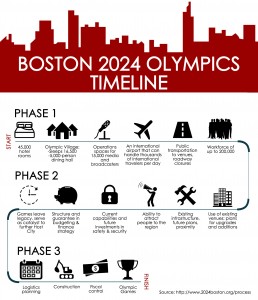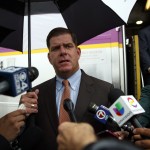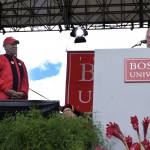
Boston Mayor Martin Walsh and members of the Boston legislative delegation looked at proposals and plans set forth by Boston 2024, a committee dedicated to planning the proposed summer Olympics, in a Friday meeting.
Boston is one of four candidate cities vying for the U.S. bid to host the 2024 Summer Olympics. On June 13, the United States Olympic Committee announced the four cities remaining on the short list for the U.S. bid were Boston, Los Angeles, Washington D.C. and San Francisco.
“This was the first chance many of these elected officials had to learn about the process and opportunities ahead,” Walsh said in a press briefing following Friday’s meeting. “We did speak about some specific proposals, but it’s important to note that this is a very fluid process, and this is just the beginning of a long and robust public dialogue.”
The planning process alone has sparked conversation about future plans for the city, but Boston 2024 Executive Vice President Erin Murphy said hosting the Olympics could bring immeasurable benefits to the City of Boston.
“It [hosting the games] would provide a once-in-a-generation opportunity to closely examine plans for the city for the next decade and beyond,” she said. “The last four U.S. Olympic Games all were cash-flow positive and yielded extensive benefits to their host cities.”
At Friday’s meeting, Walsh and other members of Boston’s legislative body were briefed on potential venue sites and plans by Boston 2024 officials, she said. These preliminary plans are subject to change based on certain factors, such as logistics, community input and official approval.
“The mayor was supportive of the Boston 2024 bid and encouraged elected officials to consider how the Games could benefit the city, the region and their constituents,” Murphy said. “The planning process alone has yielded immeasurable benefits just by starting a robust conversation about where we want our city to go in 2024 and beyond.”
While no formal documents have been filed, Boston 2024 will be submitting an official bid to the USOC on Dec. 1, she said.
Cities interested in potentially hosting the 2024 Olympics must be able to provide 45,000 hotel rooms, an Olympic Village, operations space, an international airport, transportation services and a 200,000-person workforce, according to USOC guidelines.
Once cities are chosen as candidates for the Olympics, they must upgrade their infrastructure, transportation and security, and devise a budget and finance strategy, the USOC guidelines state. Once a city is selected as an Olympic venue, these plans will be enacted.
No Boston Olympics, an organization opposed to hosting the 2024 Olympics in Boston, said hosting the games would not create long-term economic benefits. Instead, it would cost taxpayers billions of dollars and displace economic activity that would otherwise occur.
Christopher Dempsey, co-chair of No Boston Olympics, said there are more pressing priorities within the city of Boston, such as providing more housing, improving transit and refining the public school system.
“Hosting the Olympics accomplishes none of these things,” Dempsey said. “Instead, it gets our civic leaders focused on throwing a three-week party for the international elite and will leave us with debt and white-elephant venues that will make our future worse, not better.”
Several Boston residents had varying opinions on whether or not Boston is equipped to host the Olympics.
Jason Leffler, 56, of the North End, is ambivalent to the idea and said the city could not handle an event as big as the Olympic Games.
“Although I like the idea of experiencing the Olympics in my home, I just don’t think it’s practical,” he said. “Boston’s infrastructure is not equipped enough to host such big events.”
Stephen Mark, 54, of Back Bay, said Boston is equipped with the right resources to host the 2024 Olympics.
“Boston deserves more exposure,” he said. “This is a great way to get it. Most of our international tourists come here to look at colleges. It would be great to gather more people here for a different reason. The town is much bigger and developed than most outsiders think.”














